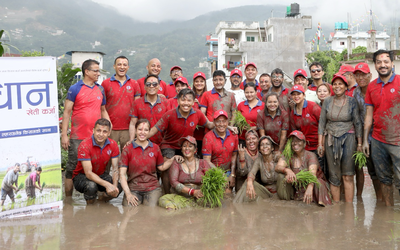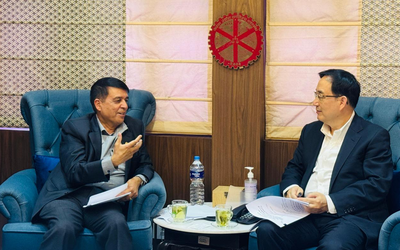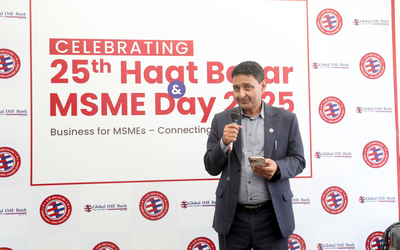This small hotel owner in far west Nepal is all praise for Narendra Modi, India's new prime minister. What's more, he expects Modi effect in his district Doti as well.
"Modi brought a growth revolution in Gujarat," he says. "He is an inspiration for us all."
Followers of Modi in the Far Western Region of Nepal take him as synonymous to investment and growth in Gujarat.
One of the fastest growing state economies, Gujarat boasts many of the world's fastest growing cities like Ahmedabad. The power surplus state holds a biennial investor summit and keeps its investors happy.
The well built and managed infrastructure of Gujarat is the major draw for Foreign Direct Investment (FDI). The state has the highest density of roads, approximately 92% paved, along with a robust energy grid. It is also developing ports targeting export markets. While the rest of the country suffers the setbacks of frequent blackouts, Gujarat holds a record of power surplus. This has been a key factor aiding its industrialization.
Despite political upheavals, the state has its FDI sector unharmed. Gujarat’s distinct land acquisition issue, ability to involve users and proper financing have limited the number of agitations, protests and conflicts that we get to witness in several parts of India and Nepal. Its land acquisition model ranked top in a study supported by the commerce ministry.
The state's industrialization policies and incentives provide industries with subsidies and concessions, ranging between 25% and 40%. With modification of tax regimes, an offer to exempt sales tax for six to ten years is another attraction.
Numerous areas have been designated as Special Economic Zones (SEZs). A separate legal framework governs their growth.
The “no red tape, but red carpet” for investors has actually proven to be highly productive for the Gujarati economy. Gujarat has ‘a single access window’ referred to as the Industrial Extension Bureau (iNDEXTb) to assist the keen entrepreneurs in investing in Gujarat. The strength of iNDEXTb has been significant in marketing and promotion, that is, counseling and facilitating entrepreneurs. Investing procedures are accessible and save time. The saying “you sow rupees in Gujarat and reap dollars” shows the profit-sharing scheme.
National and international investor outreach is an integral part of the economic administration in Gujarat. The biennial vibrant Gujarat Summit provides a platform for understanding and exploring business dynamics and opportunities in Gujarat. The focus is on branding Gujarat as an investment destination.
Looking at Gujarat, Nepalis hope to see similar things happening back home. But, amidst the customary problems of corruption and ineffective planning, Nepal has failed to offer investors satisfactory standards of policy, tax administration and implementation of pragmatic regulation.
Unlike Gujarat, we here have a lot of red tape, but no red carpet. The country with the second richest water resources has power cuts going up to 16 hours daily in some months. This power shortage is an obstacle for any foreign investor willing to set up an industry in Nepal. Furthermore, the absence of supporting infrastructure such as telecommunications, transport, water supply, and skilled labor has discouraged investors.
According to the UNCTAD data, Nepal ranks the lowest in terms of FDI potential index in South Asia i.e. 175 out of 182 countries ranked globally.
The flip side of devastating riots of 2002 turned Gujarat into India’s most investor friendly state, posting a double-digit annual economic growth rate. Contrary to this, in trying to resolve conflicts, disputes and the never ending political power debates, economic growth and initiatives have always taken a back seat in Nepal. As a result, Nepal saw a 68.3 percent drop in foreign direct investment in the current fiscal year.
Learning from Gujarat, Nepal should improve its access to adequate infrastructural and institutional facilities. Policies, legal and financial framework should be made stable. The government should aim to eradicate the excessive red tape and corruption in the existing FDI approval process. A similar summit like Vibrant Gujarat can be initiated in portraying Nepal as a brand to invest in. Development needs to be uninterrupted with the never-ending conflicts among the political parties. The labor laws need to be amended. Tax rebates, concessions and incentives need to be extended in the FDI potential sectors. The proposed FDI policy must introduce profit and risk mitigation mechanism. The government must seek to build a sustainable business climate specifically through consistency in law and policy application, adequate provisioning of infrastructure facilities and incentives to the investors. Investments must be channelized for core projects such as hydroelectricity, roads construction and multilateral trades.

Shalinta Sigdel
Sigdel is a Finance graduate from Stratford University
- Pokhara International Airport and its anticipated gains to the economy
- Apr 21, 2016
- Nepali Constitution and Economy - All’s Not Well
- Sep 26, 2015
- Economic Costs Of Kathmandu Airport Fiasco
- Mar 23, 2015
- Implications Of Fuel Price Fall
- Mar 06, 2015
- Lingering Statute Process: Economic Implications
- Jan 30, 2015















